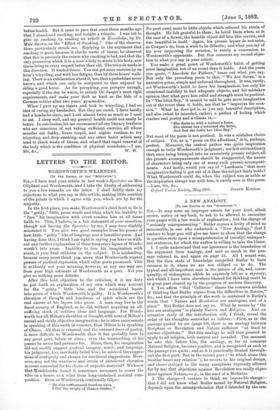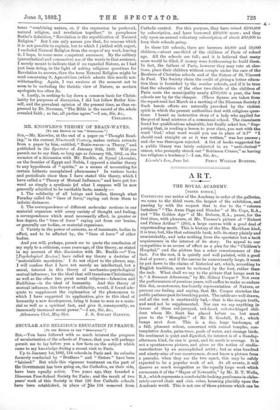A NEW ANALOGY.
[To THE EDITOR OF THE "SPECTATOR."] Sin,—It may seem an improper return for your kind, albeit severe, notice of my book, to ask to be allowed to encumber your pages with a few words of explanation ; but the charge of " seriously misrepresenting " Butler argues a levity of mind so inexcusable, in one who undertook a " New Analogy," that I venture to hope you will give me leave to show that the charge- in question rests upon a misapprehension of (mostly) unimport- ant sentences, for which the author is willing to take the blame.
1. I quite understand that our ignorance is the foundation of the argument from analogy, and said as much in the pas- sage referred to, and again on page 34. All I meant was,. that the then state of knowledge compelled Butler to have recourse to it, where we are not obliged so to do. The- typical and all-important case is the nature of sin, and, conse- quently, of redemption, which he expressly left as a mystery,. and which I have been elsewhere blamed for thinking could be in great part cleared up by the progress of modern discovery.
2. You affirm "that Cellarius ' shares the common mistake of thinking that Butler argues from the difficulties in Nature,' &c., and that the principle of the work is contained in Butler's words that " Nature and Revelation are analogous, and of a piece." But Butler does not say so. What he means by " the two are analogous" is plainly Nature and Religion. And an attentive study of the introduction will, I think, reveal the order of his thoughts somewhat as follows :—First, as in the- passage quoted by me (page 10), there is an analogy between Scripture or Revelation and Nature sufficient " at least to answer objections." But this analogy he will then proceed to apply to all religion, both natural and revealed. The moment he sets this before him, the analogy, so far as concerns Natural Religion, becomes positive, and is recognised as such in the passage you quote; and so it is practically treated through- out the first part. But in the second part (" to which alone this treatise bears any relation "), ho reverts to his original design, and shows (subject to the many exceptions expressly allowed for by me) that objections against Revelation are really objec- tions against Nature,—e.g., in the need of a Mediator.
3. The charge—I venture to think an impossible charge— that I did not know what Butler meant by Natural Religion, depends upon the misapprehension that I intended by the gen-
fence "combining nature, or, if the expression be preferred, natural religion, and revelation together," to paraphrase Butler's definition, " Revelation is the republication of Natural Religion." But I can only assure you that, for reasons which it is not possible to explain, but to which I yielded with regret, I excluded Natural Religion from the scope of my work, leaving it, I hope, to some more competent successor. By the solitary (parenthetical and concessive) use of the words in that sentence, I merely meant to indicate that if we regarded Nature, as I had just been doing, in the light of asking religious questions for Revelation to answer, then the term Natural Religion might be used concerning it, Agnosticism (which admits this much) not- withstanding. Again, I was anxious at the moment not to seem to be excluding the theistic view of Nature, as modern ,apologists too often do.
4. Lastly, in seeking to lay down a common basis for Christ- ianity for purposes of discussion, I did but follow Butler him- self, and the prevalent opinion of the present time, as thus ex- pressed by Dr. Newman, "The Bible is the record of the whole revealed faith ; so far, all parties agree."—I am, Sir, &c., CELLARIUS.















































 Previous page
Previous page